You’d think world-changing, devastating natural disasters would make sufficient fodder for anime to tell a story. But somehow – at least based on the last two major earthquake series I’ve watched – there seems to be a need to add a lot of extra… stuff. I won’t spoil Tokyo Magnitude 8.0 for those of you that haven’t seen it (and you should, as for a while it’s almost a masterpiece), but it has the shark-jumping plot twist to end them all. And Nihon Chinbotsu 2000– well, I’m not sure just exactly what it does yet. But it’s definitely going out where the buses weren’t running even before the quake. Don’t make me break this out…
Starting with Episode 4 we get into issues of racism, through the old store owner Hikita-san (who I originally thought was played by Ohtsuka Houchu, but is actually played by Umeji Sasaki). He dislikes all foreigners, which is a bit of an issue since the Mutoh family is half-Filipino. He’s especially irked by Gou speaking English so much, though that doesn’t stop him from fixing the boy’s console – the very one which (as I suspected) saved him from the old man’s arrow. Hikita says he didn’t mean to actually hit him, and while that tempts one to ask why he shot at him in the first place, I’ll give him the benefit of the doubt.
Kaitou, meanwhile, keeps us abreast of the latest dangers such as radiation, and the land progressively tilting towards the Pacific Ocean. There’s word that America is sending ships to evacuate as many Japanese as possible, with boarding determined by lottery (and good fortune, as getting to one of the five working ports would seem to present a huge challenge). The Mutoh flee the store in the nick of time in Hikita’s truck, the land collapsing behind them in a rather bizarre chase scene, with the intention of reaching “Shan City“. And that’s where things start to get really weird.
First, there’s Daniel – the foreigner they pick up on the way. He’s played by George Cockle, a half-Japanese/half-American actor who hosts a bilingual radio show in Kanagawa. At first glance Daniel seems like a fairly racist portrayal of a buffoonish foreigner, but he is at least well-versed in Japanese culture (hell, I’d sure never heard of Kintsugi), and Saru isn’t the sort of studio who’d parlay in racist stereotypes generally. Kintsugi seems like a fitting choice given the nature of the story (how symbolic it will prove to be remains to be seen). And then there’s Shan City…
Cult? Sure seems that way. They put weed in the curry, they have morphine to hand out (these are hugely illegal substances and extremely taboo in Japan), and their leader apparently thinks he can meet with the dead. “Too good to be true” is how Mari describes the welcoming Shan, where the family gets showers and clean beds in yurts to go along with their curry, and that may be what’s creeping to my mind about this series after the first episode. But it remains strangely compelling – I’d originally intended to watch only one episode tonight, but couldn’t help loading up the next one when #4 was over.
And then, things get even weirder. The person I assumed was the cult leader is a woman who calls herself “Mother“. Apparently – with the help of a seemingly mute 10 year-old named Daichi – she can talk with the dead (and it’s hinted that it might not be a hoax, if the glasses incident is to be believed). Daichi, by the way, is the grandson of Hikita, whose real reason to come to Shan City was to take him back – though just where he was planning to go with him is anyone’s guess. Mother talks to three and three only dead people a day, and there’s some dissent within the Mutoh family over whether Kouichirou should be one of them.
Daniel is apparently from Yugoslavia (why did he say England before?) and seems to have lost his family in the quake. Is he wooing Mari, and is she interested? Shan City has massive fields of marijuana under cultivation, and there’s also a school, where one assumes the kids are eventually taught a lot more than geometry. That night they have a rave (naturally, Gou is invited to the rave) where many of the guests graduate to coke. Kaitou gets high and takes over the DJ station, and eventually drags Koga into the action. And lest we forget, the wound Ayumu sustained on her calf during the quake seems to be festering, and no one (she’s working at the hospital, for cripes’ sake – where a man with locked-in syndrome can apparently predict the quakes) appears to be taking any notice.
I’m getting a growing sensation that Japan Sinks is either a work of mad genius or a dumpster fire, but at the halfway point I’m not sure which it is. Maybe both, who knows. I can say with certainty, though, that I can’t look away – I really want to know what the point of all this is, and how Yuasa and his crack(ed) team plan to make it. I just can’t help but wonder, though, why in Japan of all places they can’t just make a straight-up earthquake series. Maybe it’s like the the Eskimo–Aleut languages having 50 words for snow?


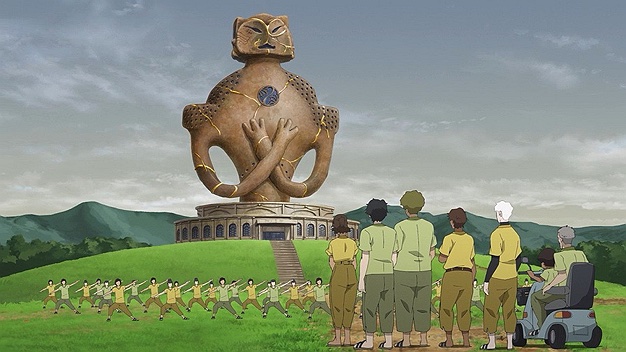
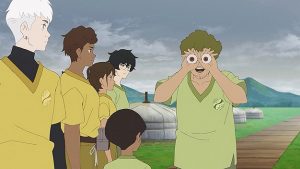
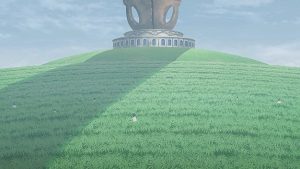
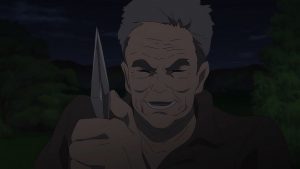
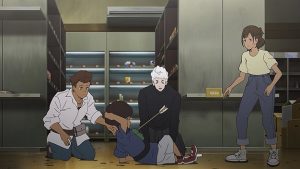
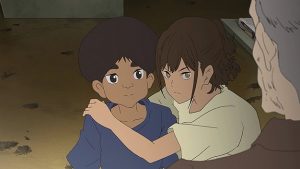
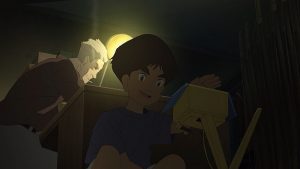
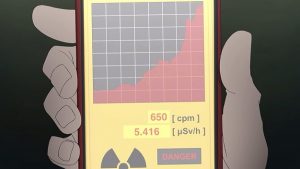
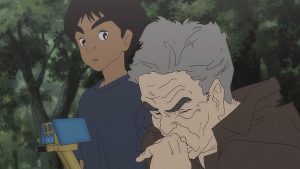
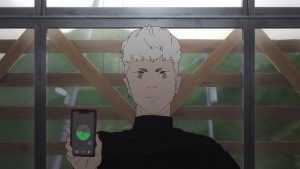
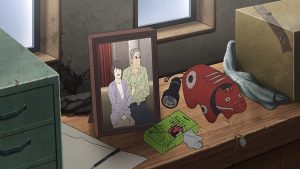
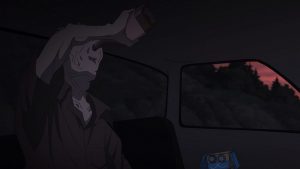
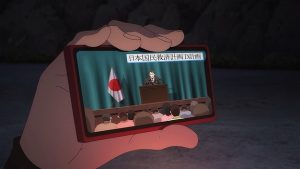
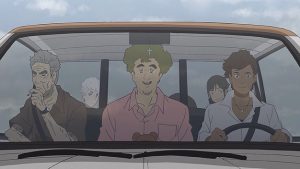
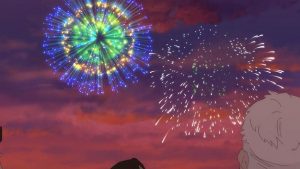
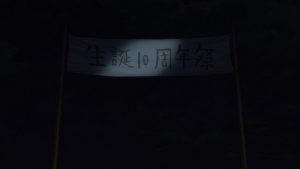
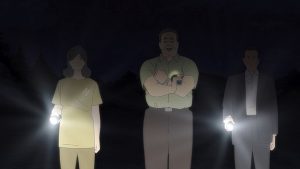
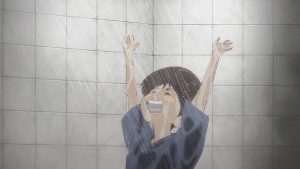
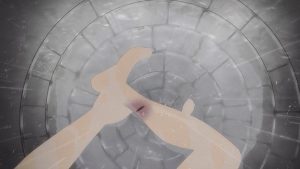
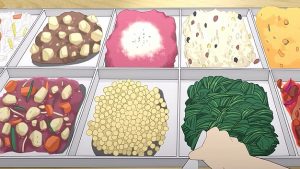
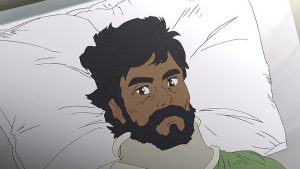
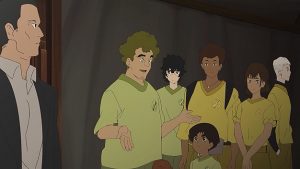
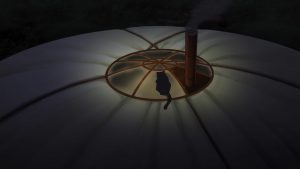
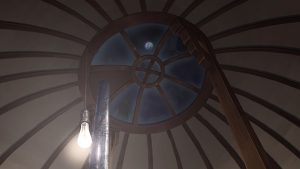
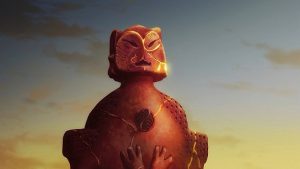
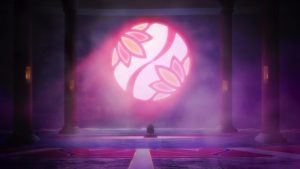
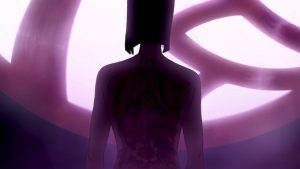
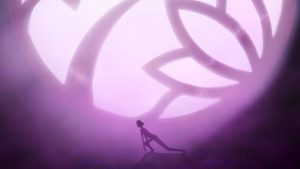

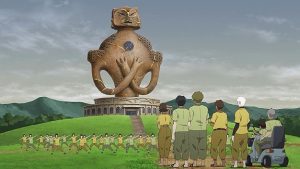
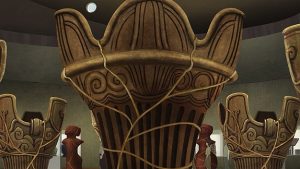
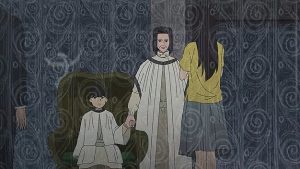
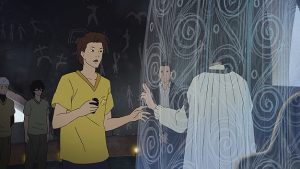
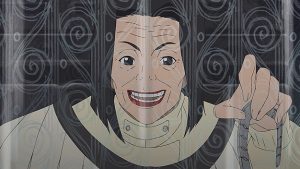
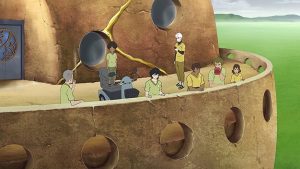
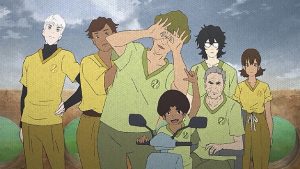
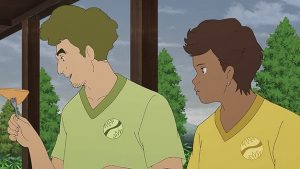
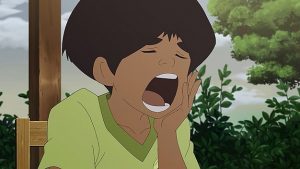
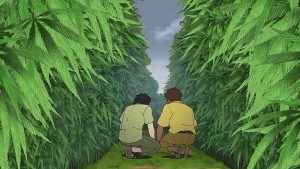
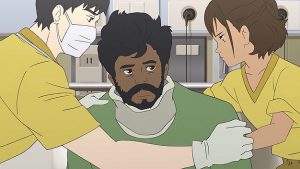
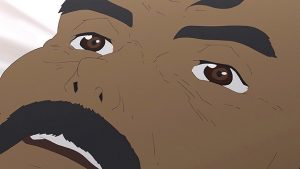
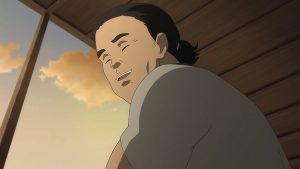
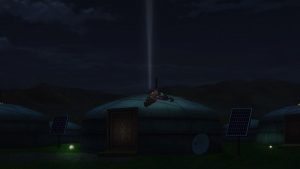
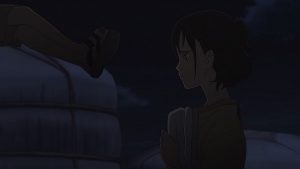
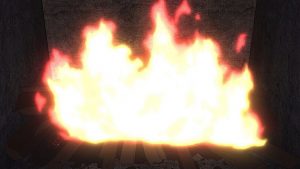
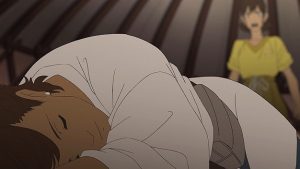
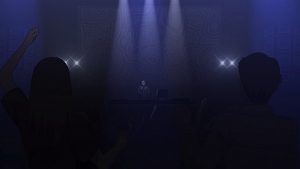
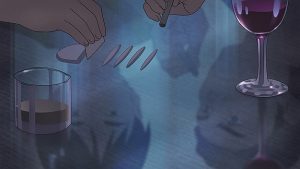
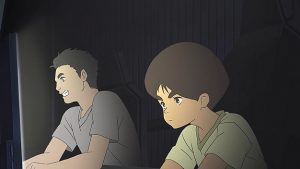
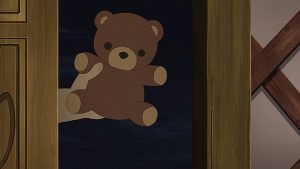
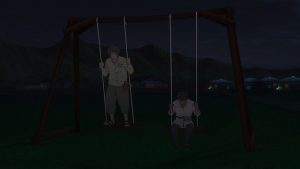
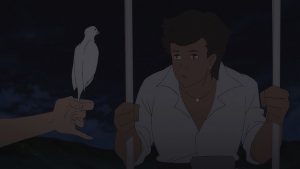
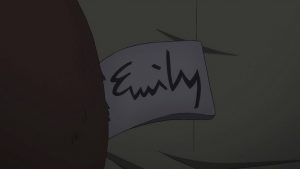
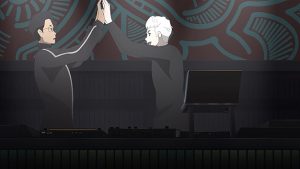
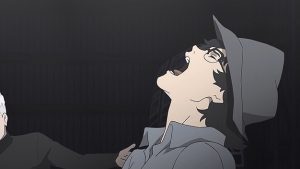
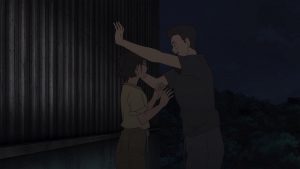
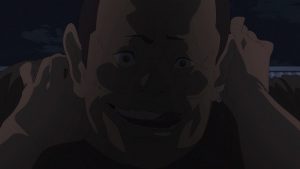
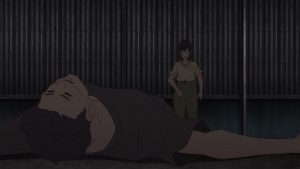
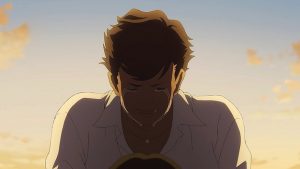
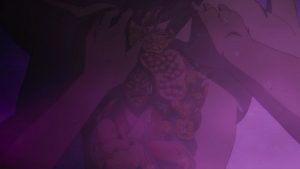
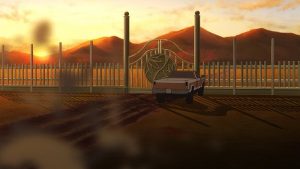
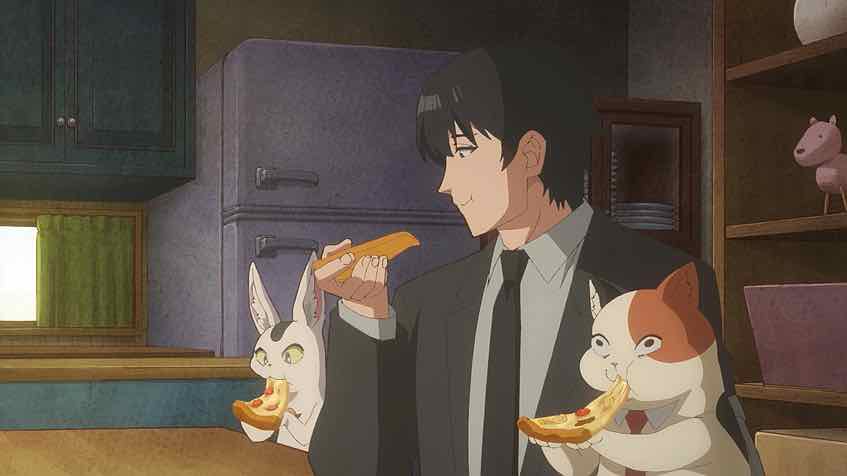
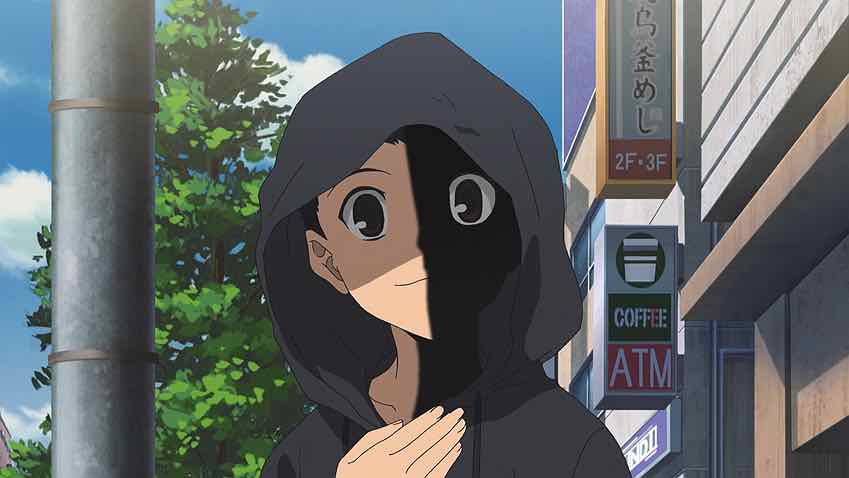
Princess Usagi
July 13, 2020 at 6:17 amI’m interested to see if they get more into Daniel’s background; his goofy antics almost seem like they could be an act and with the inconsistency in where he claims to be from (although, maybe it could be that he was born in Yugoslavia and moved to England?), perhaps he is hiding something
Dauntingoverlord
July 13, 2020 at 9:08 amTo be fair, a whole lot of Yuasa is either mad genius or a dumpster fire.
Guardian Enzo
July 13, 2020 at 9:21 amTo an extent, and that’s often the case with auteur directors. But this one kind of ups the ante.
Ronbb
July 13, 2020 at 2:51 pmThanks so much Enzo for continuing with this show. The Shan City arc was a bit of a stretch when I watched it, and I didn’t know how it added to the overall story. I like the hair cutting sequence though — I’m glad that Mari finally got a chance to mourn with Ayumu. Like you spotted, there have been subtle hints: Mari secretly charging her heart device and the birds all fleeing before the earthquake are examples that shed light on the story. An interesting note: Daniel is voiced by George Cockle, a hafu radio personality. This isn’t common in anime…I guess the fact that Saru Science welcomes talents with a more diverse background has something to do with their choices.
Guardian Enzo
July 13, 2020 at 3:02 pmWell, to be fair I talked all about George Cockle in the post. But yeah, Saru is an extremely multicultural production house.
I’m not going to be herded into an opinion about this – or any – series. I’ll get there when I get there. And as bizarre as it is, I feel no urge to drop it. It’s only ten eps and it’s a dead season for starters, but above and beyond that I still find this show weirdly compelling. Like a train wreck you can’t look away from? Maybe so.
Ronbb
July 13, 2020 at 3:25 pmYes, you did, and I will wait for your series review.
Ronbb
July 13, 2020 at 3:27 pmAnd sorry, I read your review yesterday but only had time today to share thoughts…I should have re-read the review before chiming in…
Guardian Enzo
July 13, 2020 at 3:51 pmLOL, not criticizing, just clarifying.
And for the record, my comment about “herding” was not directed at you, but at the general stampede to condemnation this show has received. With that comes a general disbelief by some that anyone could see anything worthwhile in a series. Maybe it really does end up being a dumpster fire, but who knows? It wouldn’t be the first time I’ve disagreed with mass opinion on an anime and it wouldn’t be the last. I didn’t need anyone else to tell me Blood-C was a debacle – it soon enough became unmistakable.
Ronbb
July 14, 2020 at 4:13 amThanks. And I like that about you and this blog…there is a respect to the diverse opinions that the LiA community has, and that is one of the many beautiful things here.
dc22
July 15, 2020 at 7:32 pmSeems pretty obvious it’s an entertaining dumpster fire.
The nationalistic/multicultural messages have the subtlety of an elephant in a china store.